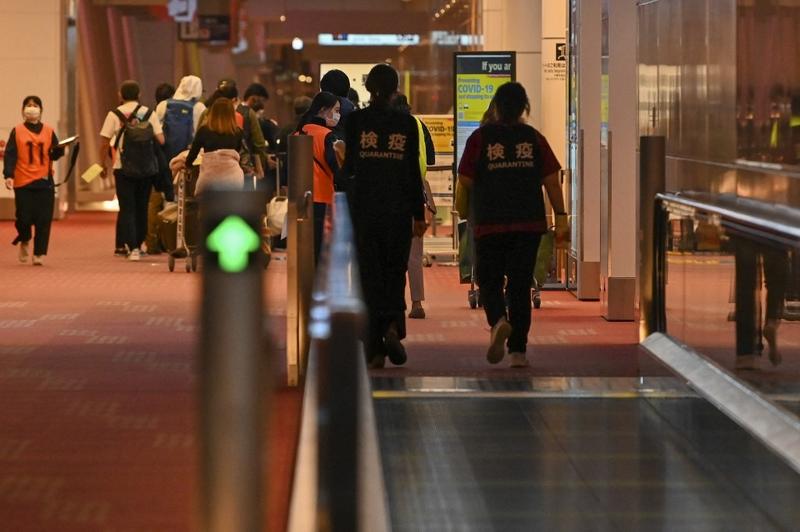 Quarantine support members walk on an international flight arrival floor at Tokyo's Haneda airport on Dec 1, 2021, as Japan suspended all new flight bookings into the country in response to the Omicron COVID variant. (KAZUHIRO NOGI / AFP)
Quarantine support members walk on an international flight arrival floor at Tokyo's Haneda airport on Dec 1, 2021, as Japan suspended all new flight bookings into the country in response to the Omicron COVID variant. (KAZUHIRO NOGI / AFP)
COPENHAGEN/LONDON – A senior official of the World Health Organization has urged countries to take science-based precautionary COVID-19 entry restrictions that are proportionate and non-discriminatory.
Hans Kluge, WHO's regional director for Europe, made the appeal at a press conference in Copenhagen on Tuesday.
READ MORE: China's COVID response science-based, effective, says spokesperson
Scientifically, there is no immediate threat for the European region at this point in time based on the information we have from China, because the (virus) variants that are circulating in China are also circulating in Europe.
Hans Kluge,
WHO's regional director for Europe
"For those countries in our region introducing precautionary travel measures at this time, we are calling for such to be rooted in science, to be proportionate and non-discriminatory," Kluge said.
"Scientifically, there is no immediate threat for the European region at this point in time based on the information we have from China, because the (virus) variants that are circulating in China are also circulating in Europe," Kluge told Xinhua.
"We share the current view of the European Centre for Disease Control (ECDC) that the ongoing surge in China is not anticipated to significantly impact the COVID-19 epidemiological situation in the WHO European Region at this time," he said.
Kluge reiterated the importance of scientific surveillance and criticized certain countries in the region for having significantly reduced their surveillance capacity for COVID-19 detection.
According to Kluge, it might be risky to ignore other significant aspects of the evolution of the virus, such as the Omicron XBB.1.5 recombinant variant, which has rapidly spread throughout the United States and is currently expanding in the European region.
Kluge called on countries to take on even more responsibility, including increasing vaccine uptake in general populations, providing additional vaccine doses to priority groups, promoting mask-wearing both indoors and on public transportation, ventilating crowded and public spaces, and providing early and appropriate treatment to patients at risk of severe diseases.
WHO urges travelers to wear masks
Meanwhile, countries should consider recommending that passengers wear masks on long-haul flights, given the rapid spread of the latest Omicron subvariant of COVID-19 in the US, WHO officials said on Tuesday.
In Europe, the XBB.1.5 subvariant was detected in small but growing numbers, WHO and Europe officials said at a press briefing.
ALSO READ: Detection of new COVID sub-variants in India raises concern
Passengers should be advised to wear masks in high-risk settings such as long-haul flights, said the WHO's senior emergency officer for Europe, Catherine Smallwood, adding: "this should be a recommendation issued to passengers arriving from anywhere where there is widespread COVID-19 transmission".
XBB.1.5 – the most contagious and now globally dominant variant of the virus that causes COVID-19 – accounted for 27.6 percent of COVID cases in the US for the week ended Jan 7, health officials have said. It is an offshoot of XBB, first detected in October, itself a recombinant of two other Omicron subvariants.
It was unclear if XBB.1.5 would cause its own wave of global infections. Current vaccines continue to protect against severe symptoms, hospitalization and death, experts say.
"Countries need to look at the evidence base for pre-departure testing" and if action is considered, "travel measures should be implemented in a non-discriminatory manner," Smallwood said.
READ MORE: Omicron spreads in India's big cities, hospitalizations still low
That did not mean the agency recommended testing for passengers from the US at this stage, she added.
Measures that could be taken include genomic surveillance, and targeting passengers from other countries as long as it does not divert resources from domestic surveillance systems. Others include monitoring wastewater around points of entry such as airports.


